Contents Soup
the French Kitchen

In a French home, the kitchen is the heart and soul of the house. Everything happens in the kitchen it is at the centre of family life, the place where everyone cooks, eats and gets together for celebrations, and where friends congregate for a drink and snack. For our family, as for many in France, life has always revolved around food and I find that the tastes and smells of certain dishes evoke powerful memories of my childhood and of different times in my life like nothing else. Food in France has always been about much more than mere sustenance. More often than not it is part of family history, with favourite recipes handed down through many generations and remembered fondly at the table. Regionality in cooking is paramount and fiercely defended.
The classics are loved and equally sacrosanct. I was brought up in a French household, albeit in England, and my family had that passion for good ingredients that you find only in France. My father reared rabbits, pigeons and chickens for the table and we gathered snails and caught crayfish. In summer we searched for wild strawberries in the hedgerows and in autumn we collected chestnuts in the woods. Fishing, hunting and foraging were the norm and part of everyday life for us, not simply a passing fad or a fashionable term on a restaurant menu. Our family ate traditional French food, of course, and both my parents were fantastic cooks.
However busy my mother and father might have been, we sat down and shared a proper meal together as a family at the table, never in front of the television or as a rushed snack. Many of the recipes in this book are for the dishes that Ive enjoyed for years, both at home with the family and at work. They are classics and, with a few adjustments here and there, they are as popular today as they have always been. In fact, Im often asked to explain what makes a recipe a classic and I think the simple answer is that it is a dish that has stood the test of time. A classic can be anything from a pan of sauted potatoes, redolent with garlic and herbs, to the most extravagant fish or meat dishes or beautiful pastries. It doesnt have to be complex or difficult to make a perfect roast chicken, served with some morel mushrooms and creamy mash potato can be one of the best of all meals.
A classic can also be a combination of flavours that works so well that it is used in many different dishes, such as sweet and sour, or tomato and basil such partnerships are the cornerstones of the classics. We French take mealtimes seriously. We dont see food as mere fuel but as something to be savoured and enjoyed, and this means that you appreciate what you eat all the more. There is always a structure to a French meal, even if it is just a light lunch or family supper, and the menu will be properly balanced. There will be vegetables and salad, and there is always a beginning and an end to a meal. The food must be served properly, not just tossed on the plate.
The starter may only be some salad leaves or a few radishes with butter and sea salt, the main course might even be just a plate of charcuterie, but there will be cornichons, good mustard and of course bread always bread. Cheese is a must for any meal, and it is the French custom to serve it with a knife and fork. Finally, there may be some fruit or yoghurt always full-fat and coffee with a little sweet treat if no dessert. This could be a square or two of good chocolate, a little madeleine or calison dAix, or some nougat de Montelimar. There are great dishes in all cuisines but for me, the cooking of France is the best in the world. Perhaps I am biased but in the French kitchen there is a wonderful respect for food that I admire so much.
Cookery is constantly evolving and there will always be fashions and fads. But I believe that every keen cook needs to master the essential techniques and be able to roast a joint or bird on the bone, to braise, pot roast, grill and poach and to make a decent sauce. These are the skills that French classics are built on. I like to refer to the great masters of French cuisine Escoffier, Carme, Boulestin and others. Yes, they may have been working a hundred years ago or more, but interestingly enough you find that there are few techniques used today that they didnt think of first. All the things we now associate with modern cuisine such as jellies, foams and water baths are not at all innovative but old skills and techniques that have simply been given a makeover.
The best recipes allow the ingredients to sing out so that their flavours can be enjoyed to the full. The skill is to respect the food, prepare it with care and present it attractively so that even the simplest soup or salad becomes an exquisite meal. Embrace these classic recipes for what they are, for the skills that are needed to cook them, for the love that we have for them and the immense pleasure they give. Here are some of my favourites.  La bonne cuisine est la base du vritable bonheur
La bonne cuisine est la base du vritable bonheur  Good food is the foundation of genuine happiness auguste escoffier
Good food is the foundation of genuine happiness auguste escoffier
The word souper means to have supper and a good soup can indeed be the main part of a meal in France, especially in the countryside. A French soup will be wholesome with plenty of vegetables, perhaps a little meat and, depending on the part of France, some butter, cream or olive oil.
Soups are very regional dishes and there are many different recipes for such classics as onion soup each claiming to be the ultimate. There are also lighter, more elegant soups such as consomms that are ideal served as a starter for a special meal.

Crme Crcy Cream of carrot soup The addition of rice to this soup makes it wonderfully creamy and smooth. Bacon fat gives a lovely depth, but you can use vegetable oil if you prefer and if youd like to keep the soup vegetarian, make it with good vegetable stock (see ). There are many stories about the origins of the name of this soup, but it could be linked to the famous Battle of Crcy, fought between the French and the British in 1346. serves 6 60g bacon fat or 60ml vegetable oil 750g large carrots, peeled and finely sliced 1 white onion, peeled and finely sliced 50g short-grain rice, such as paella rice 2 litres chicken stock (see ) 1 bunch of heritage carrots (mixed colours), peeled 100g unsalted butter, diced salt black pepper Warm the bacon fat or vegetable oil in a large saucepan. serves 6 60g bacon fat or 60ml vegetable oil 750g large carrots, peeled and finely sliced 1 white onion, peeled and finely sliced 50g short-grain rice, such as paella rice 2 litres chicken stock (see ) 1 bunch of heritage carrots (mixed colours), peeled 100g unsalted butter, diced salt black pepper Warm the bacon fat or vegetable oil in a large saucepan.


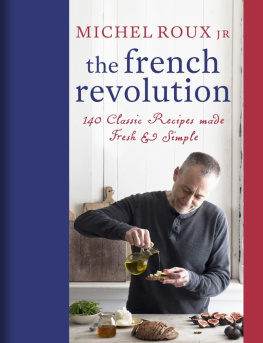
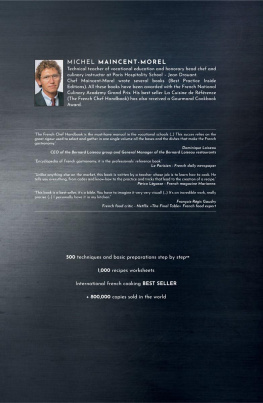
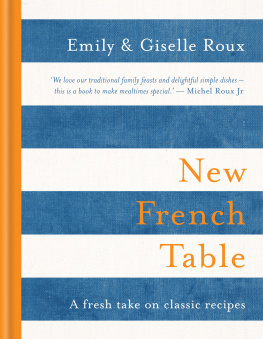
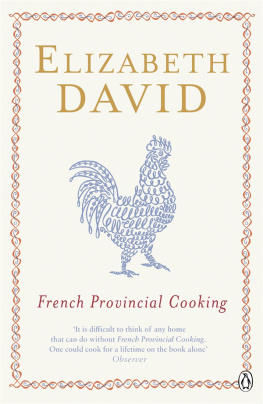

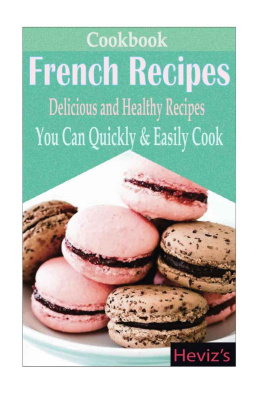
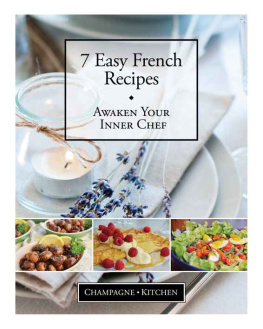
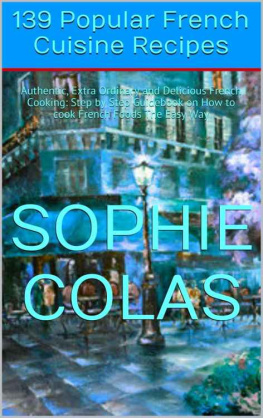





 In a French home, the kitchen is the heart and soul of the house. Everything happens in the kitchen it is at the centre of family life, the place where everyone cooks, eats and gets together for celebrations, and where friends congregate for a drink and snack. For our family, as for many in France, life has always revolved around food and I find that the tastes and smells of certain dishes evoke powerful memories of my childhood and of different times in my life like nothing else. Food in France has always been about much more than mere sustenance. More often than not it is part of family history, with favourite recipes handed down through many generations and remembered fondly at the table. Regionality in cooking is paramount and fiercely defended.
In a French home, the kitchen is the heart and soul of the house. Everything happens in the kitchen it is at the centre of family life, the place where everyone cooks, eats and gets together for celebrations, and where friends congregate for a drink and snack. For our family, as for many in France, life has always revolved around food and I find that the tastes and smells of certain dishes evoke powerful memories of my childhood and of different times in my life like nothing else. Food in France has always been about much more than mere sustenance. More often than not it is part of family history, with favourite recipes handed down through many generations and remembered fondly at the table. Regionality in cooking is paramount and fiercely defended.  La bonne cuisine est la base du vritable bonheur
La bonne cuisine est la base du vritable bonheur  Good food is the foundation of genuine happiness auguste escoffier
Good food is the foundation of genuine happiness auguste escoffier
